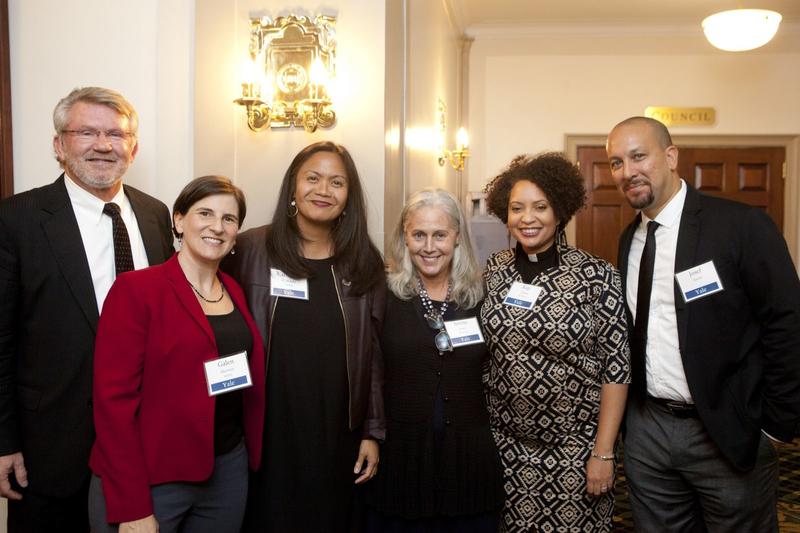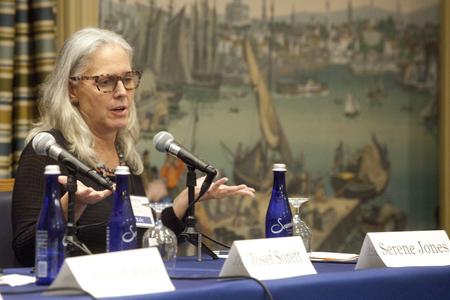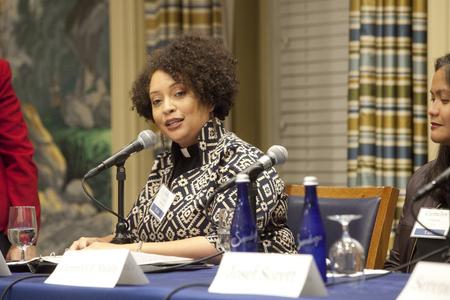Before more than 150 Yale alumni and other attendees, on the eve of historic Senate questioning of Brett Kavanaugh and Christine Blasey Ford, Yale Divinity School convened a panel conversation at the Yale Club in New York exploring equity for women—and its absence—in the #MeToo era.
The underlying question at the Sept. 26 event—how can the best of our theologies and philosophies set a new trajectory toward a humane culture around gender, sex, and power—drew passionate and, at times, deeply personal responses from the panel and audience members.
Panel member Serene Jones ’85 M.Div., ’91 Ph.D., former YDS faculty member and now president of Union Theological Seminary, drew loud applause when she spoke of the “profound rage” felt by many women as the Kavanaugh confirmation process moved forward despite a growing number of allegations of sexual misconduct.
“Another woman’s story will be laid out, like her body, to move us forward,” said Jones, referring to the hearing scheduled for the following day, where Christine Blasey Ford would testify.

Joining Jones on the panel were Kaji Douša ’06 M.Div., Senior Pastor at Park Avenue Christian Church in New York and, like Ford, an alumna of Holton Arms prep school; Carmelyn Malalis ‘96 B.A., Chair of the New York City Commission on Human Rights; and Josef Sorett, Associate Professor at Columbia University and Director of the university’s Center on African-American Religion, Sexual Politics, and Social Justice. Galen Sherwin ‘94 B.A., Senior Staff Attorney at the Women’s Rights Project of the ACLU, moderated.
***
***
Jones, a sexual assault survivor and a scholar who has devoted much of her work to understanding gender-based violence and sexual trauma, described defenses of Kavanaugh as “another ritual of affirmation of the fundamental principle upon which this nation was founded, and it goes deep into the heart of Christianity itself. That is the assumption that men have the right to sexual access to women’s bodies.”
 Only “when we recognize how deep that is in our culture,” Jones said, “can we begin to create an environment in which it is not a given. It takes mighty, mighty hard work. The women who are coming forward are, to use Christian language, saints in this movement. They are laying themselves bare to move us forward.”
Only “when we recognize how deep that is in our culture,” Jones said, “can we begin to create an environment in which it is not a given. It takes mighty, mighty hard work. The women who are coming forward are, to use Christian language, saints in this movement. They are laying themselves bare to move us forward.”
Survivors who are telling their stories—now in greater numbers than ever thanks to #MeToo—were also the focus of remarks by Douša. In response to a comment and question from an audience member, the New York-based minister spoke of the trauma that “gets written into our bodies and our ability to be loved and show compassion.”
***
RELATED CONTENT: Video highlights playlist
***
With many in the audience nodding emphatically in assent, Douša continued: “There are things people are talking about now that they never talked about before. People who survive trauma are wondering what will come of this. Part of my job is to make the experience of sharing and experiencing and coming to the truth of our trauma something that is not retraumatizing.”
 YDS Dean Greg Sterling opened the event by recounting some of the major ways in which sexual misconduct has made headlines the past year, from the world of gymnastics to Hollywood and the Supreme Court.
YDS Dean Greg Sterling opened the event by recounting some of the major ways in which sexual misconduct has made headlines the past year, from the world of gymnastics to Hollywood and the Supreme Court.
At the Divinity School, “we believe all human beings should be treated with respect regardless of their gender, sexual orientation, or identity,” Sterling said. “The #MeToo movement has empowered many survivors who have not been treated as full human beings but as pawns who could be controlled through the abuse of power.
“[But] the shattering of silence is not enough. There must be transformation. This transformation needs to include men, who are the majority of offenders. … The intoxication of power has led far too many to feel they have the prerogative to abuse a human being. The status quo must change. We have made more progress legally than we have made culturally, psychology, and morally.”